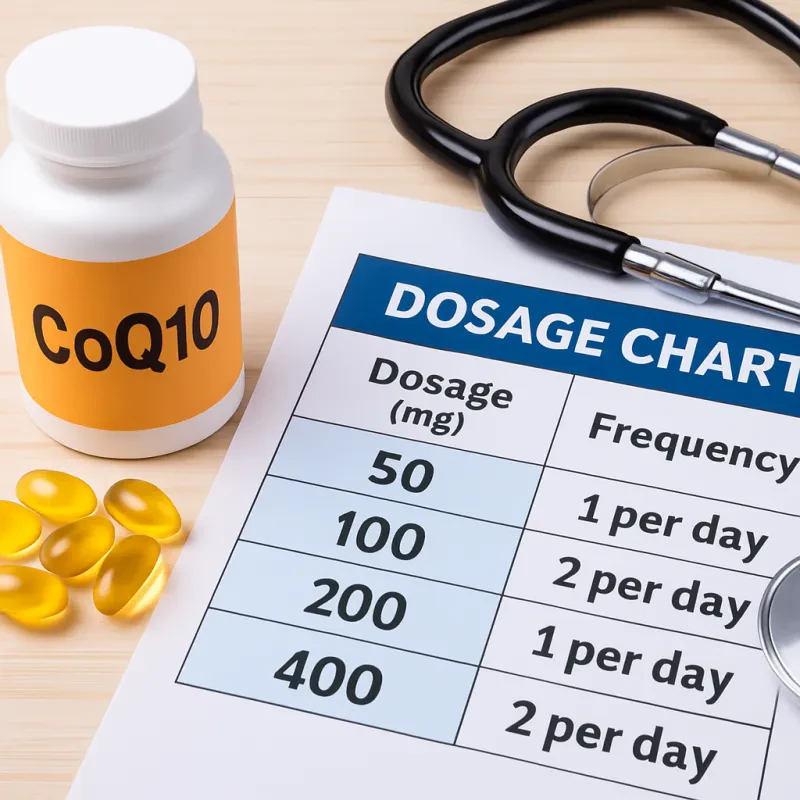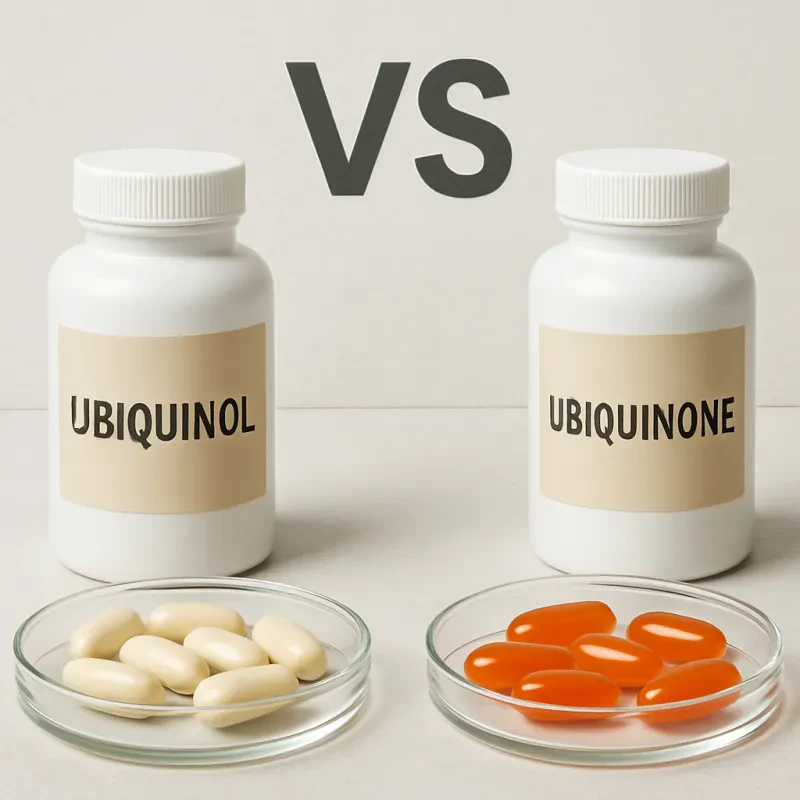Introduction to CoQ10
Coenzyme Q10, often shortened to CoQ10, was discovered in 1957 by scientists studying the biochemistry of the mitochondria, the powerhouse of the cell. It is a naturally occurring nutrient found in every cell of the body and plays a significant role in the production of cellular energy, making it essential for the health and vitality of all human tissues and organs.
CoQ10 is of vital importance in cellular function. It's primarily involved in making adenosine triphosphate (ATP), which is involved in energy transfer within cells. Its other crucial role is to serve as an antioxidant and protect cells from oxidative damage. Excessive amounts of free radicals lead to oxidative damage, which can interfere with regular cell functioning. This is known to cause many health conditions. Therefore, the antioxidant role of CoQ10 is highly important.
CoQ10 and its role in the body
Coenzyme Q10, commonly known as CoQ10, plays a crucial role in energy production within our bodies. It is an integral part of the mitochondria, the powerhouses of cells, where it helps to convert the food we eat into energy in the form of adenosine triphosphate (ATP). ATP serves as a cellular "currency," providing the energy necessary for various biological processes, including muscle contraction and protein production. Without sufficient levels of CoQ10, ATP production could decline, resulting in a lack of energy and potential impairment of bodily functions.
In addition to energy production, another significant role of CoQ10 is its function as an antioxidant. Antioxidants are substances that can prevent or slow damage to cells caused by free radicals, unstable molecules that the body produces as a reaction to environmental and other pressures. CoQ10, being fat-soluble, is particularly effective in protecting cell membranes and lipoproteins, the particles that carry cholesterol in the blood. By neutralizing harmful free radicals, CoQ10 helps to reduce oxidative stress, a condition associated with various diseases, including heart disease and cancer. Therefore, CoQ10's antioxidant role is key to maintaining cellular health and function.
The link between CoQ10 and Heart Health
A detailed discussion on how CoQ10 affects heart function: Coenzyme Q10 (CoQ10) plays a vital role in maintaining a healthy cardiovascular system. This is primarily due to its role in cellular energy production. The heart, being a highly energy-demanding organ, requires significant amounts of CoQ10 for its proper function. CoQ10 helps in the process of energy production by participating in the synthesis of Adenosine Triphosphate (ATP), the cell's primary energy source. This is particularly important for the heart's muscle cells, which constantly contract and relax to pump blood throughout the body. A deficiency in CoQ10 can impair the heart's ability to pump blood efficiently, leading to various heart conditions like congestive heart failure.
Explanation of CoQ10's role in maintaining heart health: CoQ10 also contributes to heart health through its antioxidant properties. It helps neutralize harmful free radicals that can cause oxidative damage to the heart's cells. Oxidative stress is a significant contributing factor to the development of heart diseases like atherosclerosis and ischemic heart disease. By scavenging these harmful free radicals, CoQ10 helps protect the heart's cells from damage, thereby promoting a healthy heart. Furthermore, some studies suggest that CoQ10 may also help lower blood pressure and reduce cholesterol levels, both of which are beneficial for heart health.
Benefits of CoQ10 to the heart
Coenzyme Q10 (CoQ10) brings numerous specific benefits to the heart, primarily due to its role in energy production and its antioxidant properties.
Firstly, CoQ10 contributes to the heart's energy needs. The heart is an organ that requires significant amounts of energy to function properly. It consistently contracts and relaxes to pump blood throughout the body. CoQ10 plays a crucial role in the production of adenosine triphosphate (ATP), the main source of cellular energy. A sufficient supply of CoQ10 ensures that the heart muscle cells have the energy they need to perform their vital function.
Secondly, CoQ10 serves as a powerful antioxidant that protects the heart from oxidative damage. Oxidative stress can lead to various heart conditions, including atherosclerosis and ischemic heart disease. CoQ10 helps neutralize the harmful free radicals that cause this oxidative stress, thereby protecting the heart cells from damage.
Lastly, several studies suggest that CoQ10 may help lower blood pressure and reduce cholesterol levels. High blood pressure and high cholesterol are both risk factors for heart disease. By helping to control these factors, CoQ10 can contribute to overall heart health.
In conclusion, CoQ10's role in energy production and antioxidant protection, coupled with its potential to help control blood pressure and cholesterol, makes it a vital nutrient for heart health. However, it's important to note that while CoQ10 offers these benefits, it should not replace any medical treatment or be used without the advice of a healthcare professional.
Studies supporting CoQ10 benefits for heart health
Numerous scientific studies have highlighted the benefits of CoQ10 for heart health. One notable study published in the Journal of the American College of Cardiology found that patients with congestive heart failure who took CoQ10 supplements showed significant improvement in their symptoms and had a reduced risk of major cardiovascular events. Another study published in the European Heart Journal suggested that CoQ10 could be a beneficial supplement to conventional treatment for chronic heart failure. Furthermore, a meta-analysis of clinical trials in the Journal of Cardiovascular Pharmacology and Therapeutics reported that CoQ10 supplementation could help lower blood pressure in individuals with hypertension.
Discussion of the Results and Conclusionsfrom These Studies
The results from these studies indicate that CoQ10 supplements can have a positive impact on heart health. The study in the Journal of the American College of Cardiology showed that CoQ10 supplementation could improve the symptoms of congestive heart failure, a condition characterized by the heart's inability to pump sufficient blood throughout the body. This is particularly significant as it suggests a potential role for CoQ10 in managing this debilitating condition. The fact that the European Heart Journal study suggested benefits of CoQ10 supplementation to conventional treatment for chronic heart failure further reinforces this point.
The meta-analysis in the Journal of Cardiovascular Pharmacology and Therapeutics showed that CoQ10 could help lower blood pressure. High blood pressure is a major risk factor for heart disease, and the ability of CoQ10 to reduce blood pressure levels can be a significant benefit for those at risk.
It's important to note that while these studies suggest potential benefits, CoQ10 supplementation should not replace conventional treatment strategies for heart conditions. Always consult a healthcare professional before starting any new supplement regimen.
How to increase CoQ10 levels in the body
Coenzyme Q10 is naturally present in a variety of foods. Some of the richest sources include beef, poultry, and fish such as sardines and mackerel. In the vegetable world, spinach, broccoli, and cauliflower are good sources. Peanuts and some fruits like oranges and strawberries also contain small amounts of CoQ10. However, it's important to note that cooking and processing can reduce the content of CoQ10 in these foods.
Overview of CoQ10 supplements
CoQ10 supplements are a convenient way for individuals to ensure they are getting enough of this vital compound, especially for those with specific health conditions or those on certain medications that can deplete CoQ10 levels in the body. These supplements are available in various forms such as capsules, tablets, and liquids. They come in different dosage levels and can be purchased over the counter. It's important to choose a high-quality product from a reputable manufacturer to ensure its potency and purity.
Recommendations on how to safely increase CoQ10 levels
Increasing CoQ10 levels can be achieved through a combination of diet and supplementation. Include more CoQ10-rich foods in your meals and consider taking a supplement, especially if you have a health condition that may benefit from higher CoQ10 levels. As with any supplement, it's crucial to talk to a healthcare professional before starting. They can provide personalized advice based on your individual health needs and circumstances. Furthermore, since CoQ10 is fat-soluble, it's recommended to take the supplement with a meal containing fat to improve absorption.
Possible side effects of CoQ10 supplementation
When considering CoQ10 supplementation, it's crucial to be aware of the potential side effects. While CoQ10 is generally well-tolerated and considered safe, some people may experience mild side effects such as stomach discomfort, loss of appetite, nausea, and diarrhea. In rare cases, it may also cause an allergic reaction. These side effects are typically mild and decrease over time. However, if you experience persistent or severe side effects, it's recommended to stop the supplement and consult a healthcare provider.
As for the recommendations for safe supplementation, it's always advisable to start with a low dose and gradually increase as your body gets used to the supplement. Always follow the instructions provided by your healthcare provider or the manufacturer. Since CoQ10 is fat-soluble, taking it with a meal can enhance its absorption. It's also important to remember that while CoQ10 supplementation can support overall health, it's not a substitute for a balanced diet and a healthy lifestyle. Furthermore, individuals with chronic health conditions or those taking prescription medications should consult their healthcare provider before starting CoQ10 supplementation to avoid any potential interactions.
Conclusion
n summary, this article has explored the crucial role of CoQ10 in the body and its significant benefits to heart health. CoQ10, found in every cell of the body, is involved in the production of cellular energy, making it essential for the health and vitality of all human tissues and organs. It serves as an antioxidant, protecting cells from oxidative damage and contributing to heart health.
Reinforcing the benefits of CoQ10 for heart health, it's important to note the numerous specific advantages it brings to the heart. Its role in energy production ensures the heart muscle cells have the energy they need to function, while its antioxidant properties protect the heart from oxidative damage. Studies suggest that CoQ10 may also help lower blood pressure and reduce cholesterol levels, both of which are beneficial for heart health.
In conclusion, CoQ10's multiple roles in the body, from energy production to antioxidant protection, make it a vital nutrient for heart health. However, it should not replace any medical treatment or be used without the advice of a healthcare professional.



